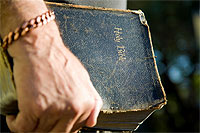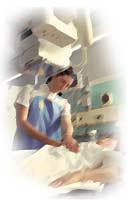On the other hand, I wasn't smiling on another day, when my sadness was more like grief. I visited Mother to give comfort and assurance, but on this day I unintentionally added to her anxiety.
"Do you think," she asked, "that I have really done enough, that I have been good enough, to go to Heaven?" Completely misreading the situation, I thought she had given me an opening to preach a sermonette about grace.
"No, Mother," I said, "No one has done enough; no one is good enough to go to Heaven. We don't get to Heaven because we have performed a long list of good works; we get to Heaven by the grace of God."
A few more sentences and I suddenly realized from my mother's expression that she wasn't hearing a word I said. She had heard only the first sentence of my answer: "No, Mother. No one has done enough; no one is good enough to go to Heaven." Of course I tried to explain, to be sure she understood, to build her trust. But, I finally left with the painful feeling that I had raised her anxiety rather than her confidence.
 A veteran preacher was teaching a class on Christian confidence and assurance. A class member became increasingly uncomfortable with what he thought was spiritual arrogance. He asked, "Are you saying that you know that if you die right now you'll go to Heaven? Isn't that terribly arrogant?"
A veteran preacher was teaching a class on Christian confidence and assurance. A class member became increasingly uncomfortable with what he thought was spiritual arrogance. He asked, "Are you saying that you know that if you die right now you'll go to Heaven? Isn't that terribly arrogant?"
With a confident twinkle in his eye, the old preacher said, "Of course that's what I'm saying. And it isn't arrogance at all; it's assurance - blessed assurance!"
My friend Ray Hawk knew a man who had a donut shop where he displayed some pamphlets Ray had written. One day a woman picked up a paper, read it hurriedly, and asked the proprietor, "Do you really believe what's in here?"
When he assured her that he did believe, she said, "I have just one question. If you die right now, will you go to Heaven?"
I knew another preacher who would say to his audience, "I want you to have a faith so strong that you know that you know that you know you are saved!"
If Robert Fulghum really learned everything he needed to know in kindergarten, why did he pursue higher education at Baylor University? Human knowledge is constantly being revised as new information becomes known. Faith in God is constantly growing as our relationship with him grows.
I had my epiphany as a young preacher when I delivered a sermon chastising people for not doing more and working harder to assure their salvation. In what I am convinced was a providential choice, the song following my sermon said, "Jesus paid it all, all to him I owe..." Because I owe that debt - to the one who paid everything for me - I live a life of faith, expressing my gratitude every day for the price of my redemption he paid at Calvary. I don't do it to try to do enough to get into heaven: Jesus already paid that debt!
 We are uncertain when we trust in ourselves and worry about our performance. When we trust in Him, we gratefully accept the fullness of redemption. Eugene Peterson has captured the essence of the Apostle Paul's message to Christians in Ephesus:
We are uncertain when we trust in ourselves and worry about our performance. When we trust in Him, we gratefully accept the fullness of redemption. Eugene Peterson has captured the essence of the Apostle Paul's message to Christians in Ephesus:
Saving is all his idea, and all his work. All we do is trust him enough to let him do it. It's God's gift from start to finish! We don't play the major role. If we did, we'd probably go around bragging that we'd done the whole thing! No, we neither make nor save ourselves. God does both the making and the saving. He creates each of us by Christ Jesus to join him in the work he does, the good work he has gotten ready for us to do, work we had better be doing (Ephesians 2:8-9 TM).
His certainty or your uncertainty. The choice is yours.












Comments
Have thoughts on this article? Leave a comment